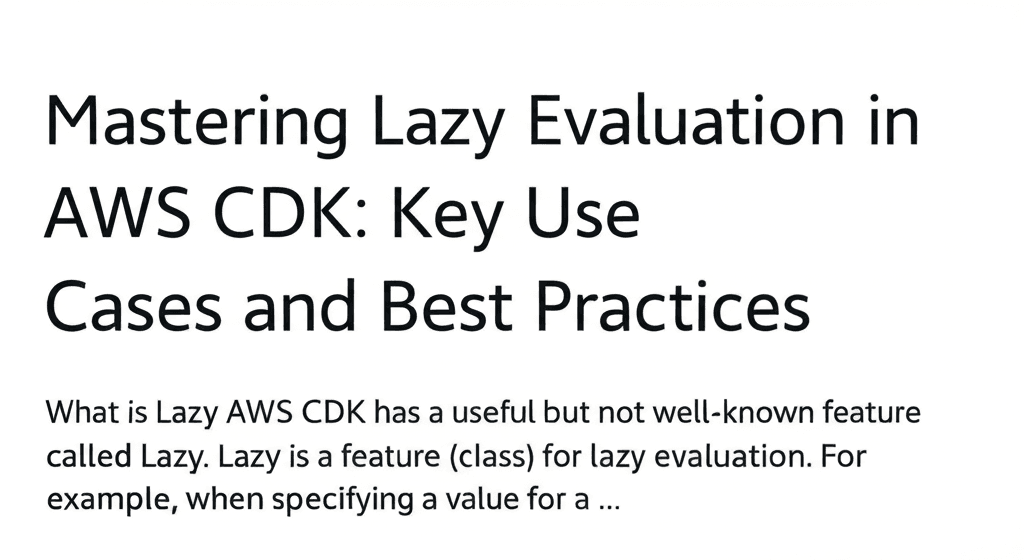Understanding Lazy Evaluation in AWS CDK
AWS Cloud Development Kit (CDK) offers a powerful yet often overlooked feature called Lazy evaluation. This sophisticated mechanism allows developers to defer value resolution until the synthesis phase of cloud infrastructure deployment, providing flexibility in constructing dynamic AWS resources.
How Lazy Evaluation Works
Lazy evaluation in AWS CDK enables you to define resource properties that aren’t immediately available during construct instantiation. Instead, their values are determined when the CDK application synthesizes the CloudFormation template.
The primary Lazy methods include:
Lazy.any()– For values of any typeLazy.list()– For array valuesLazy.number()– For numeric valuesLazy.string()– For string values
Practical Implementation Example
Consider this scenario where you need to set the desired capacity for an Auto Scaling Group based on a value that’s determined after the construct creation:
let actualValue: number;
new AutoScalingGroup(this, 'Group', {
desiredCapacity: Lazy.number({
produce() {
return actualValue;
},
}),
});
actualValue = 10;
In this example, the desiredCapacity will resolve to 10 during synthesis, despite being undefined during the AutoScalingGroup instantiation.
Key Use Cases for Lazy Evaluation
1. Cross-Stack References: When values depend on resources from different stacks that aren’t available during construct creation.
2. Dynamic Configuration: For properties that depend on runtime calculations or environment-based decisions.
3. Aspect Modifications: When using CDK Aspects to modify constructs after their initial creation.
4. Conditional Resource Creation: When resource properties depend on the existence of other resources.
Best Practices and Considerations
- Use Lazy evaluation sparingly—primarily when values depend on variables that change during synthesis.
- The inner produce function may execute multiple times during synthesis.
- For most use cases, prefer
Lazy.any()unless you specifically need type-specific behavior. - Avoid complex logic in produce functions—keep them simple and deterministic.
- Remember that Lazy values are only evaluated during the synthesis phase, not deployment.
Real-World Scenario: SSM Parameter Integration
When integrating with AWS Systems Manager Parameter Store:
import * as cdk from '@aws-cdk/core';
import * as ssm from '@aws-cdk/aws-ssm';
import * as s3 from '@aws-cdk/aws-s3';
const bucketName = ssm.StringParameter.valueFromLookup(this, "/param/bucketName");
const testBucket = new s3.Bucket(this, "TestBucket", {
bucketName: bucketName
});
This demonstrates how Lazy evaluation seamlessly integrates with AWS services to create dynamic infrastructure configurations.
Conclusion
The Lazy evaluation feature in AWS CDK provides developers with powerful capabilities to create dynamic, context-aware infrastructure as code. By understanding when and how to use Lazy.any(), Lazy.string(), and other methods, you can build more flexible and maintainable cloud applications.
While the Lazy pattern is incredibly powerful, it should be used judiciously—only when necessary to handle truly dynamic values that can’t be determined during construct creation. This approach maintains code clarity while providing the flexibility needed for complex cloud infrastructure scenarios.

Leave a Reply